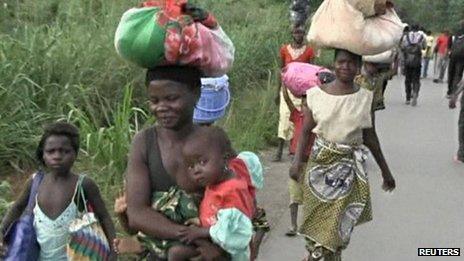Central Africa Republic crisis: Refugee numbers 'swell'
- Published

More than 170,000 people are also internally displaced in the CAR
The number of people who have fled from the Central Africa Republic has risen to 37,000 since the start of a rebellion in December, the UN has said.
There have been reports of fresh arrivals in the last two weeks since a rebel alliance seized power, it said.
Most of the refugees have gone to the north of the Democratic Republic of Congo, others to Chad and Cameroon.
President Francois Bozize himself fled to Cameroon when the rebels captured the capital, Bangui.
The Seleka rebels, an alliance of armed groups, seized power after a peace deal negotiated with Mr Bozize collapsed.
Those who have fled are mainly from Bangui, as well as the cities of Bangassou, Rifai and Zemio in the south-eastern part of the country bordering DR Congo, the UN refugee agency said in a statement, external.
"Many left their homes in a hurry and were unable to bring personal belongings with them. People are either without places to live or being accommodated by local families - who themselves live in extreme poverty," UNHCR spokesman Adrian Edwards said.
Over the last four months, another 173,000 people have became internally displaced because of the unrest.
Regional heads of state at an emergency summit on the CAR this week refused to recognise the rebel leader, Michel Djotodia.
Following the summit, South Africa said it was withdrawing about 200 troops stationed in Bangui, after 13 of their soldiers died in the rebellion.
On Thursday, South Africa's defence minister said the South African troops had not anticipated that the rebels would be armed with mortars and other heavy weapons.
Nosiviwe Mapisa-Nqakula said there had been child soldiers in the rebel ranks and that the South Africans had fought them, as one could not blow kisses and hand out sweets to an armed child.
She added that South African troops had not helped the president to flee, or provided him with protection.
- Published2 April 2013
- Published3 April 2013
- Published2 April 2013